SEO Audit Tips to Close More Deals
In the SEO industry, it is common for businesses who are looking to acquire SEO services to request an audit of their website. I know from experience that SEO audits can make or break the deal. It shows potential partners the agency or freelancer’s level of competency and expertise. It also allows potential partners to set expectations and KPIs.
As the CEO of SEO Hacker and the lead business developer of the company, I have done and sent hundreds of SEO audits to businesses. In this blog post, I’m willing to share some of my best kept secrets that may seem simple at first but have allowed me to close more deals for our team.
Note: This post was originally published on May 13, 2021, and was updated on May 31, 2022 to include new tips and data.
Customize your reports
There are a lot of lead generation tools for SEO that offer automated SEO audits for leads and we at SEO Hacker even use them ourselves.
I would say that those are only part of the process.
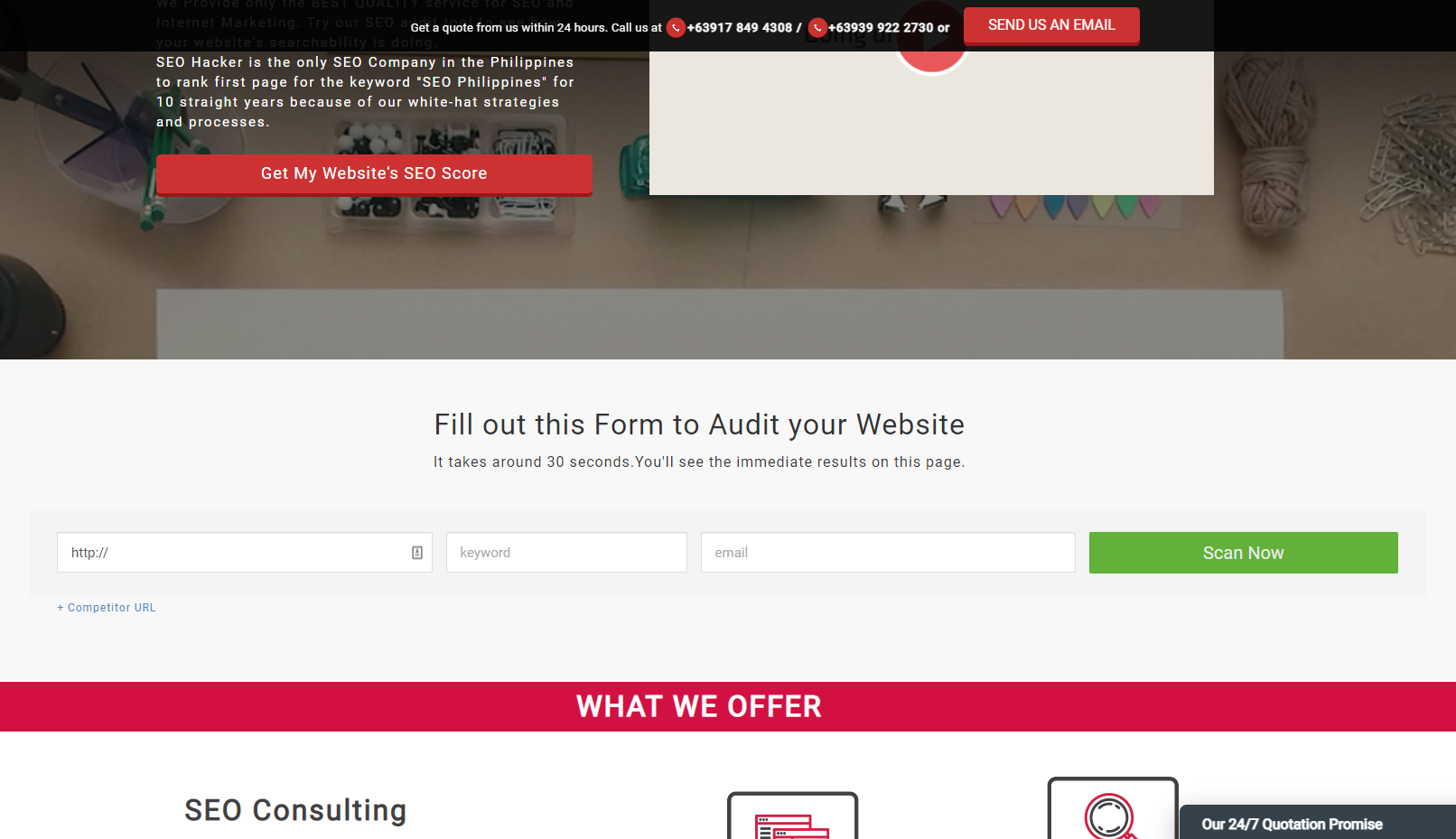
What matters more is the audit that you do when you are already in talks with your partners or during your sales pitch.
Important: SEO audits should be tailored to the client. There is no one-size-fits-all SEO audit because every website and business is unique. When tailoring an SEO audit, consider the client’s business goals, target market, and budget.
I do two things to create a fully customized report:
- Manually audit the website
- Use a tool to automate the SEO audit
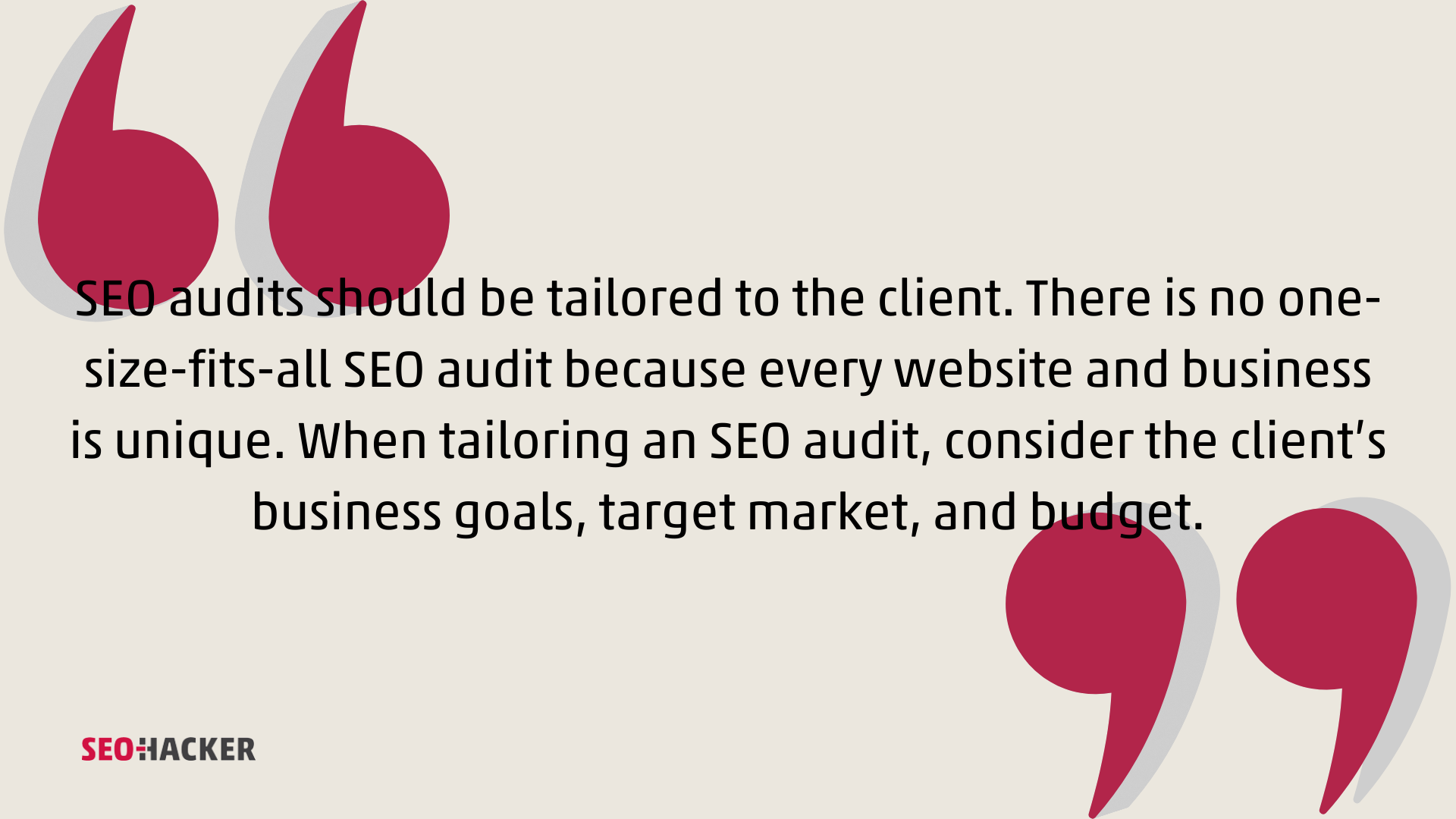
Manually audit the website
Here are some tips that may help you out in picking out the details you would want to include in your audit:
- Try to get everything out of their homepage and point out every opportunity for optimization there.
- Pick out important pages with unoptimized title tags. You don’t have to give them a full list. You just have to pick out those that could possibly be giving them more traffic and more sales.
- Check their site structure and website indexability.
- Critique their content. Many companies know that content is important in SEO but they don’t necessarily know how to write SEO-friendly articles.
- Use a backlink checker to analyze their backlinks. Link building is a hot topic for businesses looking for SEO services so if you can point out areas of improvement there you can get higher chances of closing the deal.
- Show them screenshots and/or give a list of URLs you see that need to be optimized. Partners like to be very specific. Simply giving them a list of bullet points is not enough.
Use a tool to automate the SEO audit
Next, use a trustworthy tool to fill in the gaps of your manual audit.
In this case, let’s use Netpeak Spider.

Note: Some of the features I’ll be discussing are under the PRO subscription.
One of the many things I absolutely love about this tool is just how simple it is to use and how easy the results are to understand.
So for a quick SEO audit that’s going to help me or the Accounts Manager take a cursory look at our prospect’s website, Netpeak Spider really takes the cake.
I’ll stress that last part: Even if your Accounts Manager doesn’t have direct experience with SEO (but at least understands terminologies—I mean, they need to be able to explain to your partners and prospects how things work, right?), you can ask them to run the tool and interpret the results on their own.
It’s that easy to understand.
My podcast’s—Leadership Stack—website can do better in terms of traffic, so let’s audit the website for our use case.
Step-by-step guide to using Netpeak Spider for an SEO audit
- Go to the Netpeak Software website and download the launcher.
- Open Netpeak Spider from the launcher. What you see below is the tool’s interface when you open it.
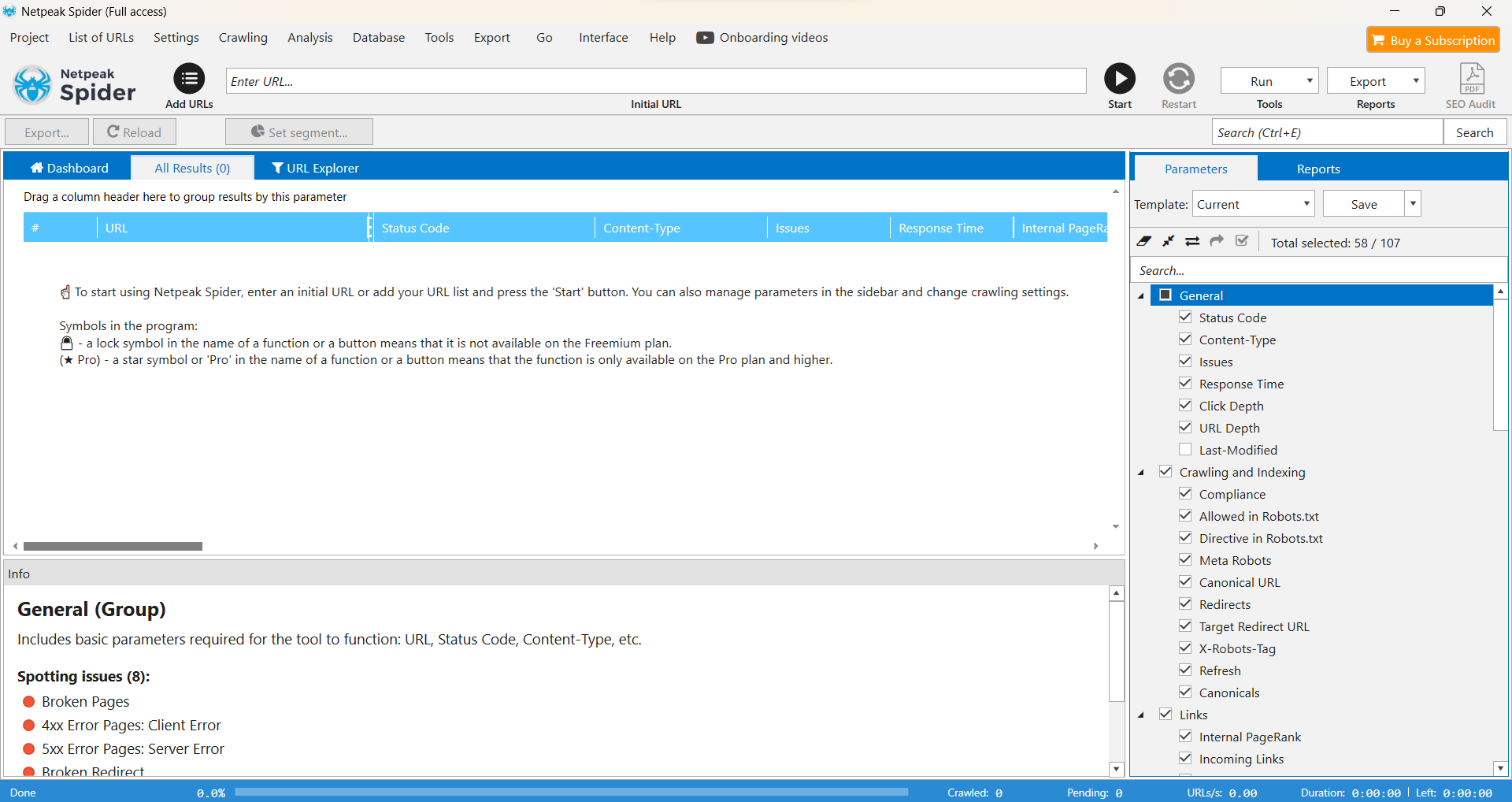
- Go to Settings.
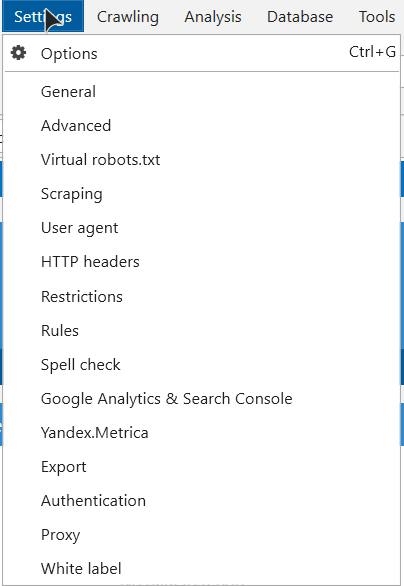
- Choose which settings are appropriate for your audit. In my case, I connected the GA/GSC accounts among other things.
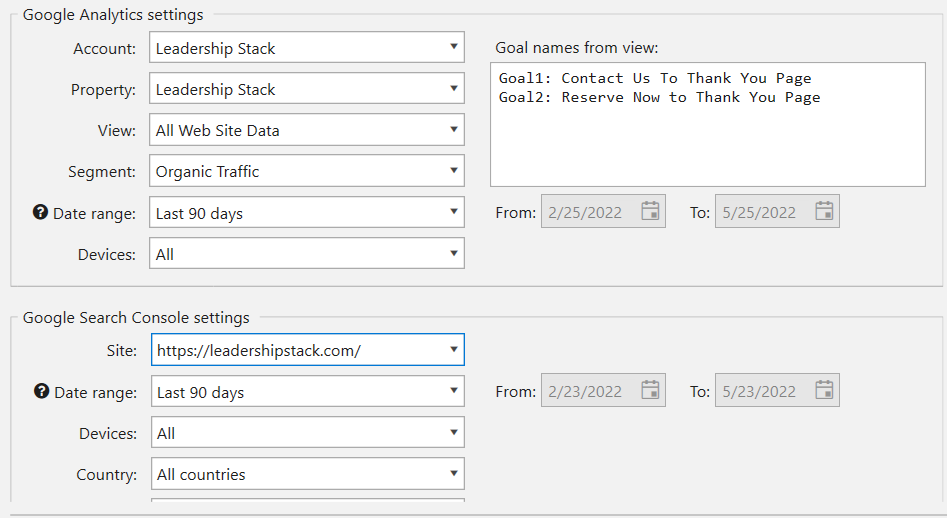
- Check your Parameters. They’re on the right side of the interface. Again, what you check is up to your needs and what you want to see in the report.
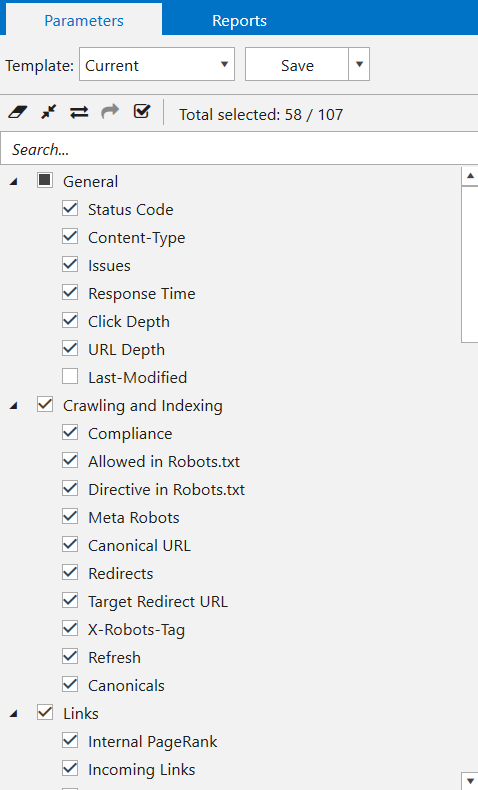
- Input the website’s URL on the Enter URL bar. It’s at the top of the interface.

- Press Start.
- After a few minutes (it can be pretty quick depending on the size of your website), the results will be displayed on the interface.

- Time to export the results. You can opt to click the SEO Audit PDF button at the top right of the interface…

- Or click Export and choose what parts of the audit you want to export.
- In this example, I decided to simply export the PDF. Here’s what the cover page of the report looks like:

If you’re on the PRO subscription, you can opt to add your details such as your company website and email to the report.
Once you’re done collating your data, you can list what you see on a simple Word document with your logo as the header. Then convert it to a PDF file and send it to the client. Sounds simple enough but it does work.
Most of the time, you don’t have to use flashy presentations. What you need is a clear, concise, and straight to the point website audit that is easy to digest for any potential client.
Further reading: An In-depth Crawl into Netpeak Spider
Show what you can do for them
Simply diagnosing the problems of a website and showing it to your potential client will not make the cut. They already know that their website has problems and it needs to be optimized. That’s the reason why they’re reaching out to you in the first place.
If they just wanted a simple audit using an SEO tool, they could have done it themselves (hence, the combination of manual and automated audits).
What partners are looking for in an SEO audit is how are you able to help them. You need to convince your potential partners that you are the SEO specialist for the job.
But before you add any solutions, you need to gauge your lead’s level of SEO knowledge.
If your lead is completely new to SEO, then you need to provide more details as to why the factors you listed need to be optimized and how important they are for ranking. Let’s say you’re working on an e-commerce website and you recommended that title tags of the product categories need to be changed.
Why did you recommend changing those title tags? Why is it important to optimize the title tag of a product category page?
But for partners who are knowledgeable already with SEO, you may not need to discuss the importance of a product category page or of a title tag to them. But you still need to give your analysis on why their existing tags are not good.
You have to remember when businesses are shopping for SEO services, you are not the only one they are engaged with. They are most likely in talks with other service providers. What you are trying to do here is making them feel comfortable with you.
By crafting the right website audit, you can build trust, show your partners you’re competent and capable, and that they could give the project to you with no second thoughts.
Further reading: Learn SEO: The Complete Guide for Beginners and Technical SEO: The Complete Guide for Advanced Users (with Checklist)
Add competitor analyses in your SEO audit
Adding a competitor analysis in your SEO audits for potential partners can be a game-changer. Most businesses will usually ask for an audit of their website alone but I highly recommend that you go the extra mile and do a quick or short audit of their competitors.
What you would want to do here is to compare some of the problems on their website versus their competitors’. Show them how they’re faring against their competitors.
You don’t need a very detailed analysis. You can use Netpeak Spider on the competitors’ websites and just insert a few comments on your bullet points. Screenshots of data are also helpful especially on backlink data and rankings.
Don’t reveal all your cards
I know that I just said you should show what you can do for them but that doesn’t mean you completely reveal everything you’ll be doing for them. There are two purposes for this:
- First is that it keeps your leads on the edge of their seats.
- Second is to protect you or your company.
Using the sample I used earlier, let’s say you listed down the product category pages of your potential client and told them that their title tags are not good. You say why they are not good but you don’t have to say what you would replace them with.
What you’re trying to do here is keeping potential partners engaged and interested. On the business side of things, you’re trying to avoid giving potential partners free work.
Key takeaway
SEO audits are only one part of the overall sales process but they are a crucial part of it. It gives your potential partners a little sneak peak on what you can do for them after putting ink on the contract. It helps set expectations and KPIs. It can be the difference between them choosing you or a different company.
